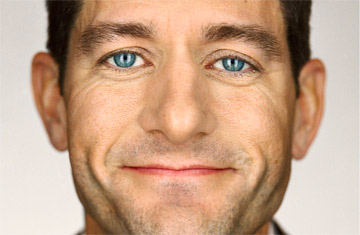
(2 of 4)
Ryan may be known as a numbers man, but he's also a devout Catholic who follows his church's lead on social issues. "The work I do as a Catholic holding office conforms to the social doctrine as best I can make of it," he said in April. That means staunch opposition to abortion, which Ryan has said should be banned even in cases of rape and incest, with exceptions only to protect the life of the mother. The National Right to Life Committee gives him a perfect rating, and last year Ryan co-sponsored a House bill that would limit federal funding for abortion to victims of "forcible rape" and incest, a point receiving increased scrutiny after Representative Todd Akin's musings on "legitimate rape." He also opposes gay marriage and Obama's reversal of the U.S. military's "Don't ask, don't tell" policy.
But Ryan says Catholic doctrine informs more than his views on social issues. His mission to reduce spending is partly inspired, he said in April, by the Vatican. "The Holy Father, Pope Benedict, has charged that governments, communities and individuals running up high debt levels are 'living at the expense of future generations' and 'living in untruth,'" he said. In which case the Ryan budget could be interpreted as a play for fairness and honesty, at least in the eyes of its maker.
THE ECONOMIST: FRIEDRICH HAYEK
Ryan first delved into the work of Austrian economist Friedrich Hayek, author of the 1944 book The Road to Serfdom, as a student at Miami University in Ohio. Since then Hayek has become a touchstone for antigovernment conservatives. Hayek fiercely opposed government intervention in the economy, which he said was too complex for politicians to manage properly. In Serfdom he went a step further, arguing that government meddling in the economy would inevitably lead to state control over all of society, possibly even dictatorship. (The book recently became a favorite of Tea Party activists convinced that Washington is amassing extreme new powers.) Ryan has recently invoked Hayek's thinking, including in a 2011 address to the Conservative Political Action Conference in which he cited the economist's concept of the "fatal conceit" and added, "The idea that a few bureaucrats know what's best for all of society, or possess more information about human wants and needs than millions of free individuals interacting in a free market, is both false and arrogant."
Ryan has acknowledged the influence of other well-known free-market economists. One is Ludwig von Mises, a hero of GOP libertarian Ron Paul, perhaps the most famous proponent of maintaining the gold standard as the basis for the U.S. dollar. Ryan is also an admirer of the late Milton Friedman, a University of Chicago economist who argued that fighting unemployment through monetary policy leads to inflation. That may inform Ryan's view that the Federal Reserve shouldn't weigh employment in its decisions. Friedman "would be extremely critical of the Federal Reserve" today, Ryan said recently, and would say "we're really playing with fire from a monetary standpoint."
